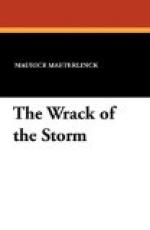2
But I repeat, beside or above these inductions of our everyday logic, in the less familiar domain of supernatural intuitions, of divination, prediction or prophecy properly so-called, we find that there was practically nothing to warn us of the vast peril. This does not mean that there was any lack of predictions or prophecies collected after the event; these number, it appears, no fewer than eighty-three; but none of them, excepting those of Leon Sonrel and the Rector of Ars, which we will examine in a moment, is worthy of serious discussion. I shall therefore mention, by way of a reminder, only the most widely known; and, first of all, the famous prophecy of Mayence or Strasburg, which is supposed to have been discovered by a certain Jecker in an ancient convent founded near Mayence by St. Hildegard, of which the original text could not be found and of which no one until lately had ever heard. Then there is another prophecy of Mayence or Fiensberg, published in the Neue Metaphysische Rundschau of Berlin in February, 1912, in which the end of the German Empire is announced for the year 1913. Next, we have various predictions uttered by Mme. de Thebes, by Dom Bosco, by the Blessed Andrew Bobola, by Korzenicki, the Polish monk, by Tolstoy, by Brother Hermann and so on, which are even less interesting; and lastly the prophecy of “Brother Johannes,” published by M. Josephin Peladan in the Figaro of 16 September, 1914, which contains no evidence of genuineness and must therefore meanwhile be regarded merely as an ingenious literary conceit.
3
All these, on examination, leave but a worthless residuum; but the prophecies of the Rector of Ars and of Leon Sonrel are more curious and worthy of a moment’s attention.
Father Jean-Baptiste Vianney, Rector of Ars, was, as everybody knows, a very saintly priest, who appears to have been endowed with extraordinary mediumistic faculties. The prophecy in question was made public in 1862, three years after the miracle-worker’s death, and was confirmed by a letter which Mgr. Perriet addressed to the Very Rev. Dom Grea on the 24th of February, 1908. Moreover, it was printed, as far back as 1872, in a collection entitled, Voix prophetiques, ou signes, apparitions et predictions modernes. It therefore has an incontestable date. I pass over the part relating to the war of 1870, which does not offer the same safeguards; but I give that which concerns the present war, quoting from the 1872 text:




